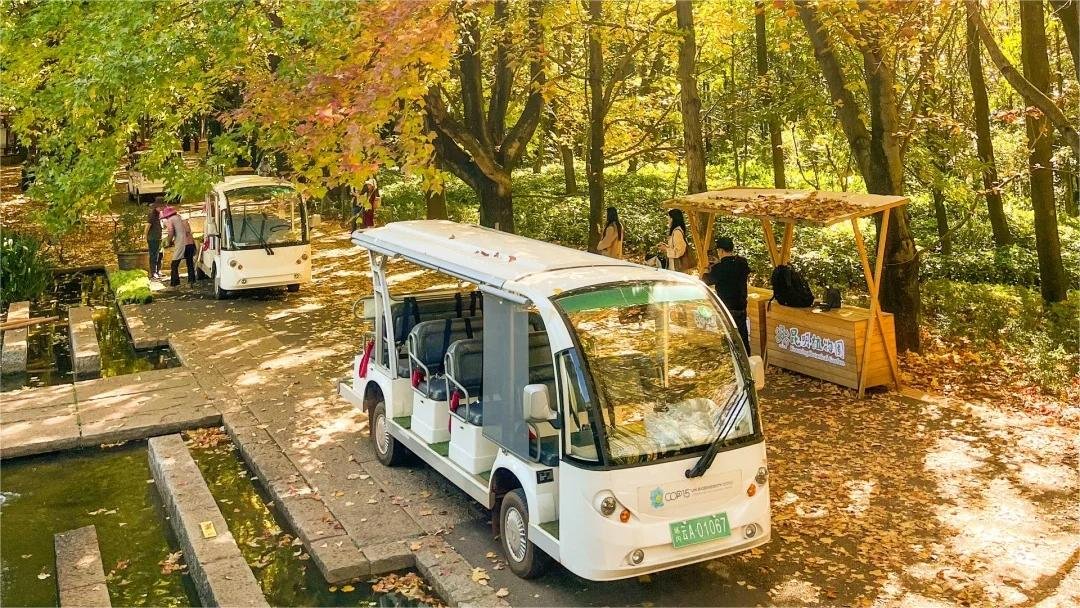Established in the 27th year of the Republic of China (1938), Kunming Botanical Garden (昆明植物园) is affiliated with the Kunming Institute of Botany, Chinese Academy of Sciences. Covering an area of 44 hectares, it features 14 specialized gardens including Camellia Garden, Rhododendron Garden, Fruit and Leaf Observation Orchard, Herb Garden, Magnolia Garden, Fuli Palace (Greenhouse Complex), Gymnosperm Garden, and Arboretum. It hosts thousands of plant species and hundreds of thousands of plants.
The Maple Leaf Corridor in Kunming Botanical Garden is highly favored by photography enthusiasts. Located in the western part of the garden, the Maple Avenue stretches about 500 meters, adorned with maple trees that are over 50 years old, along with nearly 800 young trees planted in recent years. During spring and summer, the avenue is shaded by lush trees, while in late autumn, the red maple leaves and falling yellow leaves create a fiery spectacle. It’s particularly popular for urban dwellers to visit during this season to enjoy the maple scenery, unwind, and breathe in the fresh oxygen.
Table of Contents
- Basic Information
- Location and Transportation
- Highlights of Kunming Botanical Garden
- Vlog about Kunming Botanical Garden
Basic Information
| Estimated Length of Tour | 2 hours |
| Ticket Price | 10 RMB |
| Opening Hours | 9.00 – 18.00; Last admission: 17.00 |
| Telephone Number | 0086-0871-65223628 |
Location and Transportation
Located at 132 Lan’an Road, Wuhua District, Kunming, the Kunming Botanical Garden is situated in the capital city of Yunnan Province, China, near the Black Dragon Pool Park. To get there, you can take bus 9, 79, or 128 and get off at Lan’an Road Intersection Stop (蓝桉路口站).
Highlights of Kunming Botanical Garden
Fuli Palace

Fuli Palace comprises the main greenhouse (Tropical Rainforest Pavilion and Desert Pavilion), the Plant Doctor Pavilion, Orchid Pavilion, Begonia Pavilion, Fern Pavilion, and Lithophyte Pavilion. The main greenhouse boasts a unique design and forms a harmonious complex with four independent small greenhouses. This arrangement creates a well-equipped and logically laid out greenhouse group. Through corresponding plant conservation facilities, introduction, and landscape construction, it has initially developed a distinctive system for plant conservation and display. Over 2,000 species of tropical plants are preserved here.
Water Garden

Covering an area of approximately 32 acres, the Water Garden consists of two artificial lakes, two small islands, a lakeside planting area, and an exhibition pergola. It mainly collects important monocotyledonous plant families such as ginger, iris, lily, and water lily, while also featuring species with high ornamental value from families like palm, banana, agave, and arum. More than 170 species of plants are displayed in the garden, creating a serene and picturesque environment.
Rose Garden

Covering an area of 30 acres, the Rose Garden showcases over 100 species from 25 genera of roses, including both shrub and climbing varieties. Visitors can marvel at the winter-blooming camellias and plum blossoms, early spring delights such as Chinese pear, Yunnan cherry, and weeping cherry, mid-spring beauties like peach blossoms, pawpaws, and chrysanthemums, as well as late spring attractions such as Japanese cherry blossoms and daphnes. In autumn, the garden is adorned with the splendid fruits of firethorns, hawthorns, and creeping cotoneasters. Additionally, the park features various wild fruit trees like Yunnan hawthorn, red hawthorn, Yunnan cherimoya, and loquat, known for their medicinal or health-enhancing properties.
Medicinal Herb Garden

Named after the legendary Emperor Shennong who tasted hundreds of herbs, the Medicinal Herb Garden is dedicated to the collection, conservation, and display of characteristic medicinal plants from Southwest China. Spanning 45 acres, it boasts a collection of over 1,000 species from 592 genera across 171 families, including important medicinal plants like sanqi, Dianthus superbus, and Rhodiola. The garden follows traditional Chinese garden design principles, with winding paths, resting pavilions, and scenic ponds dividing the area into distinct planting zones, such as “Shennong’s Materia Medica,” “Southern Yunnan Medicinal Plants,” “Traditional Medicinal Plants,” and “Aromatic Medicinal Plants,” providing visitors with a unique and immersive experience of China’s rich herbal heritage.


